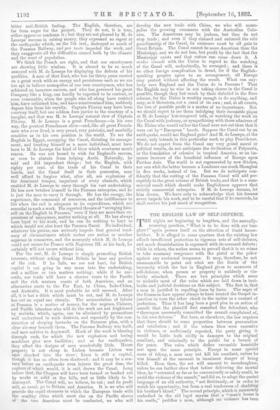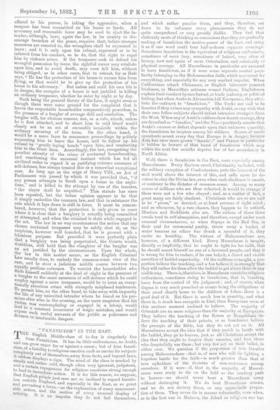THE ENGLISH LAW OP SELF-DEFENCE.
THE nights are beginning to lengthen, and the annually- recurring question, " What is to be done with our bur- glars ?" again presses itself on the attention of timid house- holders, It is alleged in some quarters that the existing law affords insufficient protection to vigorous acts of self-defence, and much dissatisfaction is expressed with its assumed defects ; while in others, the notion seems to prevail that it is no crime to take summary vengeance with the pistol or the poker against any nocturnal trespasser. It may, therefore, be not unseasonable to point out what are the limits of the immunity which the law in England gives to measures of self-defence, when person or property is suddenly or vio- lently attacked. There are two principles which seem to underlie most of the. rules which are laid down in text- books and judicial decisions on this subject. The first is, that a man is justified in repelling force by force. The sages of the Common Law appear always to have treated the Gospel in- junction to turn the other cheek to the smiter as a counsel of perfection. Thus it has long been a good plea to an action of assault that the plaintiff first assaulted the defendant, who " thereupon necessarily committed the assault complained of, in his own defence." But hero, as elsewhere, the law requires that there should be some proportion between provocation and retaliation ; and if the return blow were excessive in violence, or maliciously repeated, the party giving it would be liable both civilly in damages to the original assailant, and criminally to the public for a breach of the peace. The rules which define excusable homicide rest upon the same principle. Except in some special cases of felony, a man may not kill his assailant, unless he was himself at the moment in imminent danger of being killed. Even then, the act will amount to manslaughter, unless he can farther show that before delivering the mortal blow, he " retreated as far as he conveniently or safely could, to avoid•the violence of the assault," and did so, to adopt the quaint language of an old authority, " not fictitiously, or in order to watch his opportunity, but from a real tenderness of shedding his brother's blood." The second principle, which is commonly embodied in the old legal maxim that a " man's house is his castle," justifies a man, although no violence has been
offered to his person, in taking the aggressive, when a trespass has been committed on his house or lands. All
necessary and reasonable force may be used to eject the in- truder, although, here, again the law, in its anxiety to dis- courage breaches of the peace, requires that, before stronger measures are resorted to, the wrongdoer shall be requested to leave ; and it is only upon his refusal, expressed or to be inferred from his conduct, so to do, that the right to expel him by violence arises. If the trespasser seek to defend his wrongful possession by force, the rightful owner may retaliate upon him, and to avoid death, may even kill him, -without being obliged, as in other cases, first to retreat, for as Hale says, " He has the protection of his house to excuse him from flying, as that would be to give up the protection of his house to his adversary." But unless and until his own life is in danger, the occupier of a house is not justified in killing an ordinary trespasser, whether he enter by night or by day.
Such being the general theory of the Law, it might seem as though there were some ground for the complaint that it leaves the respectable householder comparatively powerless, in the presence of a burglar of average skill and resolution. The
burglar will, for obvious reasons, not, as a rule, attack, unless he is first attacked, and to shoot him in cold blood would clearly not be an act of excusable homicide within the ordinary meaning of the term. On the other hand, it would be a mere farce to commence proceedings by politely requesting him to leave the house, and to follow up his refusal by "gently laying hands" upon him, and conducting him to the front door. Accordingly, the law, recognising the peculiar atrocity of the crime of nocturnal housebreaking, and sanctioning the universal instinct which has led all civilised codes to regard it as justifying extreme measures of self-defence, has always treated this as a somewhat exceptional case. As long ago as the reign of Henry VIII., an Act of Parliament was passed by which it was provided that, "if any person attempts to break open a house in the night- time," and is killed in the attempt by one of the inmates, " the slayer shall be acquitted." This statute has since been repealed, but the better opinion appears to be that it simply embodies the common law, and that in substance the rule which it lays down is still in force. It must be remem- bered, however, that the protection is only given in cases where it is clear that a burglary is actually being committed or attempted, and when the criminal is slain while engaged in the act. The law in no way countenances the notion that any chance nocturnal trespasser may be safely shot at, on the suspicion, however well founded, that he is present with a felonious purpose. But provided it were perfectly plain that a burglary was being perpetrated, the Courts would, doubtless, still hold that the slaughter of the burglar was an act justified by the circumstances. Upon the whole, the law in this matter seems, as the English Criminal Law usually does, to embody the common-sense view of the Case, and to steer a judicious middle course between two . equally perilous extremes. To restrict the householder who finds himself suddenly at the dead of night in the presence of a burglar to the same measures of self-defence which he could employ against a mere trespasser, would be to treat an excep- tionally atrocious crime with strangely misplaced tenderness. To permit him, on the other hand, to take away with impunity the life of any uninvited intruder whom he found on his pre- mises after nine in the evening, on the mere suspicion that his victim e tina was contemplating or engaged in a felony, would
to firemen such a constant recurrence of tragic mistakes, and would expose such servants of the public as policemen and firemen to intolerable dangers.































 Previous page
Previous page